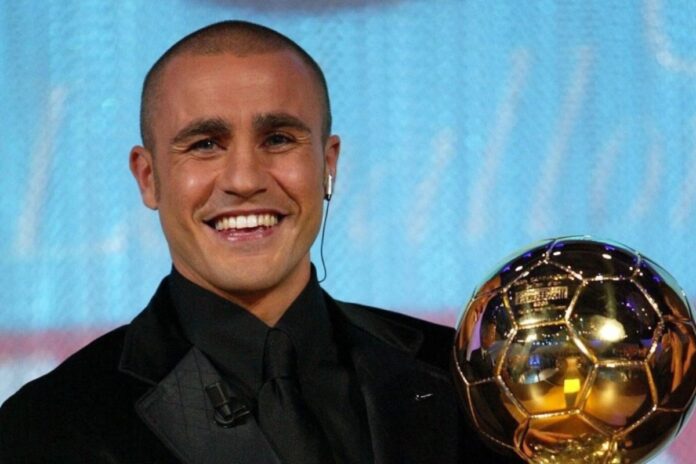Fabio Cannavaro Ufficiale OMRI: Born September 13, 1973) is an Italian football coach and former professional player, widely regarded as one of the greatest defenders in football history. A central defender, Cannavaro spent most of his career in Italy. He began his professional journey at Napoli before moving to Parma, where he enjoyed significant success, winning two Coppa Italia titles, the 1999 Supercoppa Italiana, and the 1999 UEFA Cup. After stints at Inter Milan and Juventus, he transferred to Real Madrid in 2006, joining the club alongside manager Fabio Capello. At Madrid, he won back-to-back La Liga titles in 2007 and 2008. Cannavaro later returned to Juventus for one season in 2009–10 before retiring in 2011 after a brief period at Al-Ahli.
Fabio Cannavaro is a name synonymous with excellence in football:
Fabio Cannavaro is a name synonymous with excellence in football. As one of Italy’s most iconic defenders, his career is a testament to hard work, passion, and a relentless drive for success. From his stunning performances in Serie A to lifting the World Cup in 2006, Cannavaro’s influence on the game is undeniable. In this article, we’ll take a closer look at his journey, his key achievements, and what made him a true legend of the sport.
Cannavaro was instrumental in Italy’s success at youth level, helping them secure consecutive UEFA European Under-21 Championships in 1994 and 1996. He made his senior debut in 1997 and played a key role in Italy’s run to the final of UEFA Euro 2000, earning a place in the tournament’s Team of the Tournament. Following Paolo Maldini’s retirement, he became Italy’s captain in 2002.
Cannavaro led Italy to victory in the 2006 FIFA World Cup, earning the nickname “Il Muro di Berlino” (“The Berlin Wall”) for his outstanding defensive performances, which helped Italy secure five clean sheets and concede only two goals—none of which were from open play. He was named the tournament’s second-best player, receiving the Silver Ball, and went on to win the 2006 FIFA World Player of the Year award, becoming the first and only defender in history to do so. He also claimed the Ballon d’Or in 2006, making him the only defender in a decade to win the prestigious award and the third-ever defender to do so, following Franz Beckenbauer and Matthias Sammer.
In 2009, Cannavaro surpassed Paolo Maldini as Italy’s most-capped player and retired from international football in June 2010, after Italy’s failure to progress past the group stage of the 2010 World Cup. Over the course of his career, he earned 136 caps and scored two goals for the national team. He represented Italy in four World Cups, two UEFA European Championships, the 1996 Summer Olympics, and the 2009 FIFA Confederations Cup. He remains Italy’s second-most capped player, behind Gianluigi Buffon, and is the country’s most capped defender.
After retiring, Cannavaro pursued a managerial career, coaching club teams in the Middle East and China. He briefly managed the China national team in 2019 and was the head coach of Serie B club Benevento during the 2022–23 season. In April 2024, he took over as head coach of Serie A club Udinese, successfully steering the team out of the relegation zone.
The Early Years: Rising Through the Ranks
Fabio Cannavaro was born on September 13, 1973, in Naples, Italy. Growing up in a football-loving city, he quickly developed a passion for the game. Starting his career at the youth level, Cannavaro’s talent was evident early on. His breakthrough came when he joined Napoli’s senior team at the age of 18, a club with a rich football tradition.
A Star in Serie A
Cannavaro’s move to Serie A marked the beginning of his rise as a top-tier defender. Known for his speed, composure, and tactical awareness, he quickly became a staple in Italy’s top league. Over the years, he played for several top clubs, including Parma, Inter Milan, and Juventus, cementing his reputation as one of the most consistent defenders in the league.
Key Stats:
- Serie A Appearances: Over 300
- Goals Scored: 20+
Winning the Ballon d’Or
In 2006, after leading Italy to victory in the FIFA World Cup, Cannavaro was awarded the Ballon d’Or, an honor given to the best footballer in the world. His incredible performance throughout the tournament, particularly in defense, was instrumental in Italy’s triumph. This achievement solidified his status as one of the greatest defenders in the history of the game.
The 2006 World Cup: A Moment of Glory
No discussion of Fabio Cannavaro’s career would be complete without mentioning his pivotal role in Italy’s 2006 World Cup victory. As captain of the national team, Cannavaro’s leadership and defensive mastery were critical in Italy’s success. His ability to neutralize some of the world’s best attackers was a key factor in the team’s triumph.
Defining Moments:
- The Final: In a tense match against France, Cannavaro played a crucial role in keeping the French attack at bay, even during the penalty shootout.
- Leadership: As captain, Cannavaro’s calm demeanor and tactical insights were essential in guiding Italy through the tournament’s challenges.
A Legendary Career Abroad
After the 2006 World Cup, Cannavaro made a high-profile move to Real Madrid, where he continued to shine. Despite the challenges of adjusting to the intensity of Spanish football, he proved to be a valuable asset to the team. During his time at Madrid, Cannavaro won several La Liga titles and continued to demonstrate his defensive prowess on the global stage.
International Legacy
Cannavaro’s impact was not confined to club football. For over a decade, he was a key player for the Italian national team, amassing 136 caps and playing in multiple international tournaments, including the UEFA European Championship and FIFA World Cup. His leadership and defensive skills were consistently praised, and he remains a symbol of Italian football excellence.
The Cannavaro Effect: What Made Him Great?
Fabio Cannavaro wasn’t just another defender; he was a game-changer. His ability to read the game, coupled with his physicality and technical skills, set him apart from many of his contemporaries. Here are a few attributes that made him one of the greatest defenders in football history:
- Tactical Intelligence: Cannavaro had an exceptional understanding of positioning, often being in the right place at the right time.
- Aerial Ability: Despite not being the tallest, his leaping ability and timing made him a formidable presence during aerial duels.
- Composure Under Pressure: Cannavaro thrived in high-pressure situations, never letting the intensity of the game affect his decision-making.
Fabio Cannavaro After Retirement: A New Chapter
Following his retirement from playing, Cannavaro transitioned into management. His experience and understanding of the game made him a natural fit for coaching, and he’s since taken on various managerial roles, including stints in China with Guangzhou Evergrande.
Despite his new role, Cannavaro’s influence on the football world remains strong, and he continues to inspire new generations of defenders.
Frequently Asked Questions (FAQs)
What clubs did Fabio Cannavaro play for?
Cannavaro had a successful club career, playing for Napoli, Parma, Inter Milan, Juventus, and Real Madrid.
What was Cannavaro’s greatest achievement?
Cannavaro’s greatest achievement was leading Italy to victory in the 2006 FIFA World Cup and winning the Ballon d’Or the same year.
Why is Fabio Cannavaro considered one of the best defenders?
Cannavaro is considered one of the best defenders due to his exceptional skills, leadership, and ability to perform in high-stakes situations, particularly during the 2006 World Cup.
Wrapping Up: Fabio Cannavaro’s Legacy
Fabio Cannavaro’s legacy as one of the greatest defenders in football history is firmly established. From his leadership during Italy’s 2006 World Cup victory to his influential club career, Cannavaro has left an indelible mark on the sport. His combination of talent, intelligence, and determination made him a true legend of the game. Whether on the field or in his post-retirement roles, Cannavaro continues to inspire and shape the future of football.




